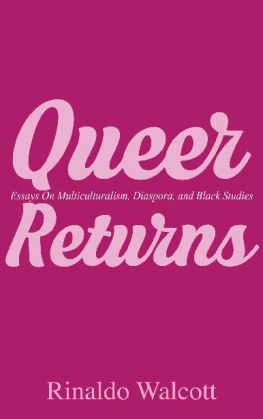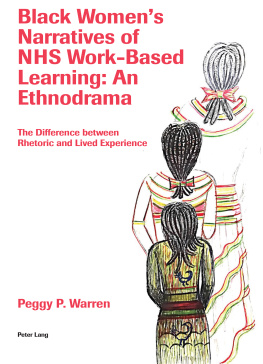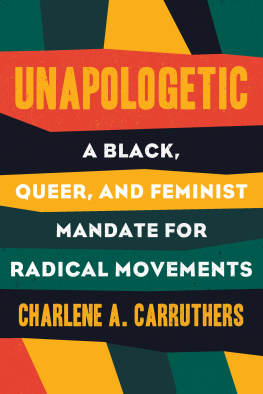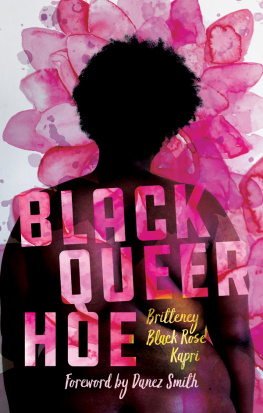Zami: A New Spelling of My Name by Audre Lorde; Crossing Press/Penguin Random House 1982 by Audre Lorde. Excerpts used by permission.
2021 by Mecca Jamilah Sullivan
All rights reserved
Library of Congress Cataloging-in-Publication Data
Names: Sullivan, Mecca Jamilah, author.
Title: The poetics of difference: queer feminist forms in the African diaspora / Mecca Jamilah Sullivan.
Description: Urbana: University of Illinois Press, 2021. | Series: The new Black studies series | Includes bibliographical references and index. | Identifiers: LCCN 2021006472 (print) | LCCN 2021006473 (ebook) | ISBN 9780252043963 (cloth ; acid-free paper) | ISBN 9780252086038 (paperback; acid-free paper) | ISBN 9780252052897 (ebook)
Subjects: LCSH: African literature (English)Black authorsHistory and criticism. | African literature (English)Women authorsHistory and criticism. | American literatureAfrican American authorsHistory and criticism. | American literatureWomen authorsHistory and criticism. | Literature, Experimental20th centuryHistory and criticism. | Identity (Philosophical concept) in literature. | African diaspora in literature. | Women, Black, in literature. | Feminism and literature. | Queer theory.
Classification: LCC PR9340 .S85 2021 (print) | LCC PR9340 (ebook) | DDC 820.9/928708996dc23
LC record available at https://lccn.loc.gov/2021006472
LC ebook record available at https://lccn.loc.gov/2021006473
Acknowledgments
Well thats different.
This is the loving way Black women in my life let me know Im up to something strange, unusual, somewhat new. The phrase carries weightnot quite judgment, but critique. And yet, it often also carries tenderness, as though the words are meant to remind the hearer that she is cared for, in spite of the difference, and because of it.
Many people have loved, cheered, cared for, and critiqued me through this project. I have to thank, first, my mother, Dr. Martha A. Sullivan (big Mecca), whose tremendous example sets the scope of my vision; my father, James P. Sullivan, whose poet soul is truly special; and my little brother, Malik, style icon, with whom I first began to imagine a practice of black/queer care.
My deepest gratitude to the University of Illinois Press, especially to Dawn Durante, whose vision and attentive eye have made this project what it is, and Alison K. Syring Bassford, who led the book to full fruition. Huge thanks to Laurie Prendergast for helping me through the process with immeasurable generosity and heart, in the midst of a global pandemic.
I am ever grateful to my teachers and mentors: Thadious Davis, your generosity even at the earliest stages of this project has been remarkable. Herman Beavers, Heather Love, and Salamishah Tillett, this book would not be possible without you. My thanks to the great Cheryl Wall, whose presence was a light Im honored to have known. Jennifer DeVere Brody, Evie Shockley, Alexis De-Veaux, Darryl Pinckney, Samuel Delany, John H. Bracey, Andrea Hairston, Paula Krebs, Barbara Savage, Ginetta Candelario, Ania Loomba, E. Frances White, Ellen Eisenman, Ann Ferguson, Brenda Allen, Amy Kissell, Anne Rosenthal, and Ginger Leigh, thank you for supporting the kinds of thinking that have led me here, and teaching me how to make it all work. Deepest gratitude to Kevin Quashie, with whom I have learned and laughed so much over all these years, each moment a gift.
Many thanks to my fabulous colleagues at Bryn Mawr College and in the Tri-College Consortium, whose intellectual engagement and support have brought much joy to this process. Thanks especially to E-House and its regulars, including Linda-Susan Beard, Kate Thomas, Bethany Schneider, Jennifer Harford-Vargas, Jamie K. Taylor, Colby Gordon, Chloe Flower, Michael Tratner, Dan Torday, Gail Hemmeter, Betsy Litsinger, Matthew Ruben, Jen Callaghan, Bryn Thompson, and the homie Airea D. Matthews. I am also grateful to the Africana Studies Program, the Gender and Sexuality Studies Program, the Latin American, Iberian, and Latina/o Studies Program at Bryn Mawr, as well as the Tri-Co Philly Program. I cant think of a warmer, more vibrant intellectual home in which to have developed these ideas. Thanks also to the department of English at the University of Pennsylvania and the department of Women, Gender, Sexuality Studies at UMass for making this project fuller and better.
I am grateful for the support of the following fellowships and organizations, without which this project would not have been possible. Deepest thanks to the Institute for Citizens and Scholars/ Woodrow Wilson Career Enhancement Fellowship, the Office of the Provosts and the Faculty Research Grants Program at Bryn Mawr College, the Postdoctoral Fellowship in Black Feminism at Duke University, the Postdoctoral Fellowship in African Diaspora Literature at Rutgers University, the Gaius Charles Bolin fellowship at Williams College, the Mellon Foundation, the Social Sciences Research Council, the Faculty Fellowship at the Five College Center for the International Study of the Americas, the Barnard College Center for Research on Women, the Modern Language Association, and the National Womens Studies Association, whose support has been invaluable.
Ive been fortunate to spend time with many incredible minds in these academic streets. Thank you to everyone who has helped shape this project with their questions, feedback, and collaborative musings: GerShun Avilez, Tsitsi Jaji, Sarah Mantilla Griffin, Isabel Geathers, Julius Fleming, Savannah Shange, Tanisha C. Ford, Brandon Woods, Tshepo Masango-Cherry, Nicole Meyers-Turner, Kirsten Leng, Abbie Boggs, Meta DuEwa Jones, Aldon Lynn Nielson, La Marr Jurelle Bruce, Rhon Manigault-Bryant, James Manigault-Bryant, Rashida Braggs, Cae Joseph Messena, and Marlon M. Bailey, thank you for your imprints on this book. Shout out to The Feminist Wire for giving me new ways to touch community in the early stages of this project, and the Philadelphia Burlesque Academy for keeping it moving. LH Stallings, Marlon Moore, Angelique Nixon, Treva Lindsey, and Marlo David, thank you for your brilliance and the crazy good times. Darius Bost, I learn more about thought and humanity every time I talk to you. C. Riley Snorton, my truest homie, thank you for being a rider. Started from the bottom; to the AC we go.
Thank you to my day-ones: Effie Richardson, Nina Sharma, Erica Locke, Nicole Shawan Junior, Connie Utada, Kamilah Aisha Moon, Kieu Smith, Keisha Warner, Lecynia Marie Swire, Hanifah Walidah, you have helped me see this through. None of this would be without you. Cheryl Clarke, cher pote, Im tickled to call you my friend. Jeanette Aycock, there are no words for my love and gratitude. No hill for a stepper, indeed!







